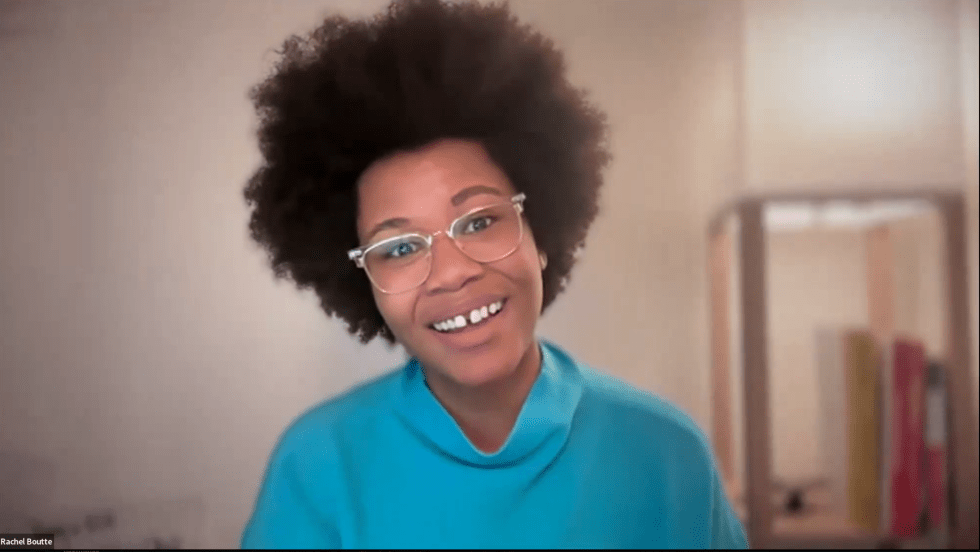
On January 31, 2024, C3EN hosted a virtual town hall focused on mental health, with a keynote lecture on community trauma by Pilot Awardee Rachel Boutté, PhD, MDiv, assistant professor in family and preventive medicine at Rush University. 53 people attended the meeting, comprised of researchers, community leaders, and community members.
The meeting began with a summary of the seven town halls in west and south Chicago in 2023. “The town halls were an effort to create listening sessions across the Chicagoland area,” said town hall co-chair Santosh Basapur, assistant professor at Rush University. In each session, community members were asked to share the health issues concerning them, their suggestions on how these issues should be prioritized by researchers, and their views on research. Qualitative data analysis showed that the top issues concerning Chicago communities are mental health, chronic disease, housing, racism, and fresh food access. “When we asked, ‘Why don’t chronic health issues come before the mental health?’ people were very clearly saying that we need to fix the social issues or the mental health issues first, then we can go to chronic health,” he said.
In her presentation, “Community Trauma and Mental Health,” Boutté began by addressing the problem of gun violence in Chicago, noting that more than half of Black Chicagoans would witness a shooting by the age of 40, a problem disproportionately prevalent on Chicago’s west side. Exposure to violence has detrimental effects on mental health, including an increase in depression, anxiety, PTSD, substance use disorders, and suicidal thoughts and behaviors—which are even harder to address when additional social stressors are present. “Mental health is health,” she said. “There is no way to separate mental health from physical health because they’re connected in the same way that all of us have a brain that is connected to a body.”
Paradoxically, noted Boutté, most research shows that Black Americans experience lower rates of mental health problems than white Americans—yet, when diagnosed, Black Americans have more debilitating and chronic mental health problems. This may be because only one in three Black Americans who need mental health care can access it, she said. Barriers include provider bias, insurance, and stigma.
Suggested solutions include violence prevention programs, prevention programs for youth (including Pilot Awardee Chuka Emezue’s Brotherly ACT project), community mental health initiatives, and early detection and intervention. But, she noted, “When I work in the clinic with my patients, usually the first thing I say to people is, ‘I’m so glad you’re here to get help. I’m here to support you.’ And then I say, ‘I couldn’t possibly know the best thing for you, because I just met you, and you’ve been with you for however many years the person has been alive.’ I think of it as something collaborative: I’m going to bring my experience and my expertise, but, at the end of the day, you’re going to have really good ideas and insight into what works for you.”
The discussion then opened to the floor—many discussed the barrier stigma plays in getting mental health care. Diagnosis can be problematic when too many criteria are at play (“sometimes you have to tick all the boxes to get a diagnosis,” noted Boutté)—and because the primary population studied is white, symptoms may present differently in BIPOC communities. Yet because of the broad spectrum of mental health, which includes depression and anxiety, as well as schizophrenia, others may not seek care because not enough differentiation has been made apparent when describing mental health and what may be a problem. Further problems listed included a dearth of BIPOC providers and cultural misunderstanding between providers and patients of different backgrounds—though it was noted that Chicago, as a city, has more Black mental health professionals than many other communities. Problems may persist for generations as parents who have not received mental health care may pass on maladaptive patterns and behaviors to their children, and/or may simply not have the capacity to address problems when operating under survival conditions. Easily accessible online resources and forms of entertainment may worsen existing issues by increasing comparison to fictional ideals.
Many suggested that simply communicating as a community can improve conditions: people sharing their experiences can help others get support by decreasing stigma and increasing insight into the availability and quality of resources. Changing how we describe problems and offer solutions may also be helpful (“We could say ‘tap into your mind’ or ‘meditate’ instead of ‘helping your mental health,’” suggested C3EN Community Engagement Core program coordinator Joshua Rawls). Overall, building relationships must be prioritized to build trust and create environments where people can safely share thoughts and emotions. Yet “even great care can’t change context… we can’t just breathe through violence or lack of resources,” said Boutté. “We need to work on both at the same time.”